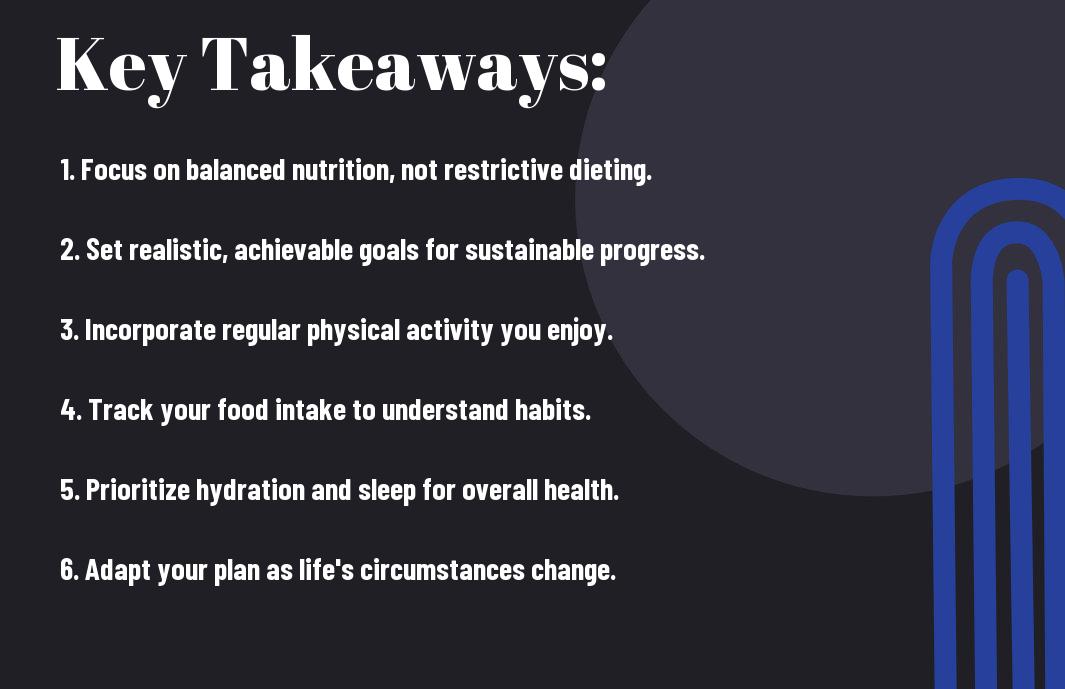Sustainability in your weight loss journey means adopting habits that you can maintain over the long term. To achieve lasting results, it’s important to develop a plan that fits your lifestyle, preferences, and goals. This post will provide you with practical strategies to build a sustainable weight loss plan that not only helps you shed pounds but also promotes overall health and well-being. By integrating these approaches, you can ensure that your weight loss efforts are effective and enjoyable, setting the stage for lifelong success.
Key Takeaways:
- Set Realistic Goals: Establish achievable and specific weight loss targets that can be incorporated into your daily routine.
- Focus on Nutrition: Prioritize a balanced diet rich in whole foods, including fruits, vegetables, and lean proteins to promote sustainable weight loss.
- Incorporate Exercise: Develop a regular physical activity plan that includes both strength training and cardiovascular exercises to enhance overall health.

Understanding Sustainable Weight Loss
Before entering into weight loss, it’s crucial to grasp what sustainable weight loss truly means. It involves adopting healthy habits that not only help you shed pounds but also enable you to maintain your ideal weight for the long haul. This approach goes beyond quick fixes or fad diets, focusing instead on balanced nutrition, physical activity, and lifestyle changes that fit seamlessly into your daily life.
The Science Behind Weight Loss
For effective weight loss, understanding the body’s energy balance is key. Weight loss occurs when you burn more calories than you consume, and this can be achieved through a combination of improving your diet and increasing physical activity. The body’s metabolism also plays a vital role in determining how efficiently you convert food into energy and how many calories you burn at rest.
Common Myths and Misconceptions
Loss of weight often comes with several myths that can misguide your journey. One common misconception is that you must completely eliminate certain food groups to succeed — this is not true. In fact, a balanced diet incorporating various food items is much more sustainable. (Educating yourself about nutrition can empower your decisions.)
Common myths like “carbs are the enemy” or “you need to work out every day for hours” can lead to frustration and burnout. It’s crucial to question these beliefs and focus on moderation, variety, and enjoyment in your eating habits and exercise routines. (Understanding the facts over myths will enhance your long-term commitment to weight loss.)
Setting Realistic Goals
It’s necessary to set realistic goals to ensure your weight loss journey is both effective and sustainable. By outlining achievable objectives, you cultivate motivation and increase the likelihood of sticking with your plan over time. This approach not only enhances your chances for lasting success but also promotes a healthier relationship with food and exercise.
SMART Goals for Weight Loss
Around every successful weight loss plan are SMART goals—Specific, Measurable, Achievable, Relevant, and Time-bound. By using this framework, you give your targets clarity and direction, making it easier to track progress and stay motivated on your journey.
Long-term vs. Short-term Goals
One significant aspect of goal-setting for weight loss is distinguishing between long-term and short-term objectives. While short-term goals help you stay focused and engaged, long-term goals provide a broader vision for where you want to be. (Setting these goals strategically can guide your daily actions and habits.)
And, while short-term goals may include weekly weight targets or specific dietary changes, long-term goals encompass broader lifestyle transformations, such as adopting healthier eating habits or integrating regular physical activity into your routine. (This balance ensures you stay committed to your overall health rather than fixating solely on the scales.)
Nutrition Basics
Despite the abundance of information available, understanding nutrition fundamentals is vital for sustainable weight loss. A balanced approach to eating will help you develop healthy habits that support your goals. Focus on nourishing your body through a variety of foods, incorporating plenty of fruits, vegetables, lean proteins, and whole grains to create a well-rounded diet that offers both satisfaction and nutrition.
Balancing Macronutrients
The right balance of macronutrients—carbohydrates, proteins, and fats—is necessary for your overall health and weight management. Tailoring these nutrients to your specific needs will help you maintain energy levels while supporting muscle mass and fat loss. Aim for a personalized ratio that aligns with your lifestyle, preferences, and goals.
Importance of Whole Foods
Macronutrients are best sourced from whole foods rather than processed alternatives, as they provide necessary vitamins, minerals, and fiber. By focusing on whole foods, you enhance your overall diet quality and create a sustainable eating plan. (Choosing whole foods over processed items can significantly impact your health in the long term.)
With this focus on whole foods, you empower yourself to make informed decisions that promote long-lasting health benefits. Foods like fruits, vegetables, whole grains, and lean proteins not only fuel your body but also support a feeling of fullness and satisfaction. (Prioritizing whole foods means reducing your reliance on packaged, nutrient-poor options.)
Developing an Exercise Routine
Once again, establishing a consistent exercise routine is necessary for sustainable weight loss. It not only helps you burn calories but also boosts your metabolism and elevates your mood. Aim for a balanced mix of cardiovascular activities and strength training to maximize benefits and keep your body challenged. Consistency is key, so find a schedule that fits comfortably into your lifestyle without adding stress.
Finding Activities You Enjoy
Activities you genuinely enjoy will motivate you to stay active in the long run (choose activities that bring you joy and make you look forward to exercise). Explore various options—be it dancing, hiking, swimming, or joining a sports league—to discover what resonates with you.
Incorporating Strength Training and Cardio
Around your routine, it’s necessary to integrate both strength training and cardio for optimal results. This combination not only aids in weight loss but also enhances your overall fitness, making you stronger and more resilient. Aim for at least two strength training sessions per week alongside moderate to vigorous cardio workouts.
Indeed, a balanced approach to exercise allows you to reap the benefits of both strength training and cardiovascular workouts. Strength training helps build and maintain muscle mass, which can boost your metabolism. In contrast, cardio workouts improve heart health and increase endurance. By alternating between these two forms of exercise, you prevent workout monotony and promote a more comprehensive fitness journey, ultimately leading to better adherence to your weight loss plan.

Monitoring Progress
All successful weight loss plans rely heavily on consistent monitoring of your progress. By tracking your achievements and challenges, you can maintain motivation and accountability. Recognizing patterns in your behavior helps you make informed adjustments to your plan, ensuring long-term success and a healthier lifestyle.
Tracking Your Food and Exercise
With a clear system for logging your food intake and exercise, you will gain valuable insights into your habits. Utilizing apps or journals can help you stay organized and visually track your daily activities. This process not only highlights your accomplishments but also reveals areas where you can improve.
Adjusting Your Plan as Needed
Tracking your progress allows you to spot trends that may indicate the need for adjustments in your weight loss plan. If you find that certain techniques or routines aren’t delivering desired results, it may be time to switch things up. (This decision should align with your long-term goals and personal preferences.)
To optimize your journey, regularly evaluate the effectiveness of your current methods. If your weight loss plateaus or you feel unsatisfied, modifying your diet, workout intensity, or overall approach may reignite your success. (Taking proactive steps is imperative for keeping your weight loss plan aligned with your evolving lifestyle and needs.)
Building a Support System
Your weight loss journey doesn’t have to be a solo endeavor. A robust support system can enhance motivation, provide accountability, and foster a sense of community. Surround yourself with individuals who encourage your goals, share your interests, and understand your challenges. Whether through family, friends, or online groups, nurturing these connections will help you maintain focus and commitment throughout your journey.
Engaging Friends and Family
Systematically involving friends and family can significantly enhance your weight loss efforts. Share your goals with them, invite them to join in on healthy activities, or simply ask for their encouragement and support. By creating a shared commitment, you generate a supportive environment that can help you stay motivated and accountable.
Seeking Professional Guidance
Before initiateing on your weight loss journey, consider enlisting the help of professionals, such as a registered dietitian or a personal trainer. This guidance will provide you with tailored advice, structured meal plans, and exercise routines designed to fit your unique needs, making your journey not only more effective but also sustainable.
It is imperative to understand that professional guidance can play a significant role in achieving lasting results. Nutritionists can help you identify food choices that align with your goals while ensuring you’re getting the necessary nutrients for your body. Personal trainers can design workout plans suited to your fitness level, ensuring you stay engaged and injury-free. Together, these experts provide the knowledge and support that can lead you to lifelong success in managing your weight.
Conclusion
Presently, crafting a sustainable weight loss plan that works for life requires a balanced approach integrating healthy eating, regular exercise, and mindful habits. By setting realistic goals, listening to your body’s needs, and making gradual changes, you can create a lifestyle that supports long-term weight management. Stay committed to understanding your unique journey and adjusting your plan as necessary, ensuring that it remains enjoyable and suitable for your life. Ultimately, embracing this sustainable mindset will empower you to achieve and maintain your weight loss goals for years to come.
FAQ
Q: What are the important components of a sustainable weight loss plan?
A: A sustainable weight loss plan should include balanced nutrition, regular physical activity, behavioral modifications, and regular monitoring of progress. A balanced approach focuses on incorporating a variety of foods, emphasizing whole grains, fruits, vegetables, lean proteins, and healthy fats while limiting processed foods and sugars. It is also important to develop a consistent exercise routine that you enjoy, as this increases the likelihood of sticking with it in the long term. Behavioral modifications can include setting realistic goals, developing mindfulness around eating habits, and addressing emotional triggers related to food. Finally, regular monitoring through journaling or using apps can help to track progress and identify any necessary adjustments.
Q: How can I stay motivated throughout my weight loss journey?
A: Staying motivated requires a multifaceted approach. First, setting specific and achievable goals can keep you focused and provide a sense of accomplishment as you reach each milestone. Additionally, finding a support system—such as friends, family, or weight loss groups—can create accountability and encouragement. Keeping a positive mindset is equally important; celebrate small victories and be aware of any setbacks without letting them derail your efforts. Engaging in activities you enjoy, such as a new sport or fitness class, can also help maintain motivation and make the process enjoyable. Lastly, reminding yourself of the benefits of a healthier lifestyle, such as increased energy and improved mood, can further fuel your motivation.
Q: How do I make adjustments to my weight loss plan if I’m not seeing results?
A: If you find that your weight loss plan is not yielding the desired results, it’s important to take a step back and evaluate various aspects of your plan. First, assess your eating habits and portion sizes to ensure they align with your goals. It may be helpful to keep a food diary for a week to identify any patterns or areas for improvement. Next, analyze your exercise routine: if it has become too routine, consider changing the intensity, duration, or type of workouts you are doing to challenge your body in new ways. Additionally, check if you are giving yourself enough recovery and care between workouts to prevent burnout. Lastly, consult with a healthcare professional or a registered dietitian for personalized insights and adjustments that can optimize your plan for better results.










Reply